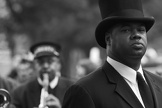 I’ve got an article in The Observer about the sad history of how psychologists have misunderstood grief and why it turns out to be much more individual than traditional theories have suggested.
I’ve got an article in The Observer about the sad history of how psychologists have misunderstood grief and why it turns out to be much more individual than traditional theories have suggested.
As well as the individual variations, it also riffs on the massive diversity of cultural grief and mourning practices.
At the beginning of Nicole Kidman’s 2008 film Australia, the audience is shown a warning. “Exercise caution when watching this film,” it says, “as it may contain images or voices of deceased persons.” The notice, perplexing for most viewers, was for the benefit of Aboriginal Australians, who may have a taboo against naming or encountering representations of the dead.
The taboo has spiritual roots relating to not disturbing spirits of the departed but anthropologist Katie Glaskin describes how the naming taboo “serves to make people ‘acutely aware’ of the person whose name is being avoided”. As a form of remembering through non-remembrance, it is a psychological mirror image of more familiar traditions where creating and cherishing a representation of the deceased is considered necessary for healthy mourning. This underlines the fact that mourning can take place in a radically different way, based on a thoroughly different understanding of death, highlighting how any claims to a universal “psychology of grief” pale in the face of human diversity.
The article has many more examples and we’re now at a stage where the idea that we go through specific ‘stages’ of grief is untenable scientifically – but lives on due to its powerful grip on society.
This is most worrying because it has been used to pathologise people who don’t seem to be grieving ‘appropriately’, branding them as ‘in denial’ when really they’re just dealing with things in their own way.
Link to article in The Observer.
Dear Vaughan Bell,
I read with interest your article. I studied loss for over 25 years and came to a similar conclusion that you put forward that there is no right way to grieve only “your way” and no stages to be negotiated. I have witnessed a remarkable ability of most people to negotiate grief well and thrive after loss. But I would strongly challenge the notion put forward by Dr Bonanno that most people have a short ( up to a few weeks of emotional pain) period of emotional pain. This is just simply not the case – certainly not in the UK. If you are at all interested here is a TED talk I did about loss:
Best wishes
Geoff Warburton
Hey, you’re welcome to use my photo to illustrate your post, and I appreciate that you link to my flickr page, but you’re also obligated to also give me a photo credit. Thanks for your attention to that matter.
Regards,
Derek Bridges